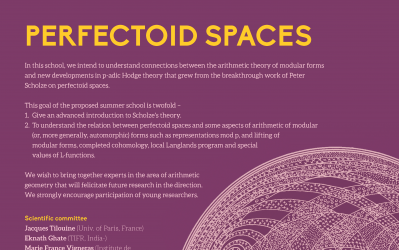Scientific committee:
- Jacques Tilouine (University of Paris, France)
- Eknath Ghate (TIFR, India)
- Marie France Vigneras (Institute de Mathématiques de Jussieu, France)
- Sujatha Ramdorai (University of British Columbia, Canada)
- Adrian Iovita (Concordia University, Canada)
Workshop on "Perfectoid spaces" will be from 09 - 13th September, 2019 and the discussion meeting on "p-adic automorphic forms and perfectoid spaces" will be from 16-20th September, 2019.
In this school, we intend to understand connections between the arithmetic theory of modular forms and new developments in p-adic Hodge theory that grew from the breakthrough work of Peter Scholze on perfectoid spaces (see P. Scholze "Perfectoid spaces" Publ. Math. de l’IHES 116 (2012)).
p-adic methods play a key role in the study of arithmetic properties of modular forms. This theme takes its origins in Ramanujan congruences between the Fourier coeffcients of the unique eigenform of weight 12 and the Eisenstein series of the same weight modulo the numerator of the Bernoulli number B12. After the work of Deligne on Ramanujan's conjecture it became clear that congruences between modular forms reflect deep properties of corresponding p-adic representations. The general framework for the study of congruences between modular forms is provided by the theory of p-adic modular forms developed in fundamental papers of Serre, Katz, Hida and Coleman (1970's-1990's).
p-adic Hodge theory was developed in pioneering papers of Fontaine in 80’s as a theory classifying p-adic representations arising from algebraic varieties over local fields. It culminated with the proofs of Fontaine's de Rham, crystalline and semistable conjectures (Faltings, Fontaine-Messing, Kato, Tsuji, Niziol,...). In order to classify all p-adic representations of Galois groups of local fields, Fontaine (1990) initiated the theory of (φ, Г)-modules. This gave an alternative approach to classical constructions of the p-adic Hodge theory (Cherbonnier, Colmez, Berger). The theory of (φ, Г)-modules plays a fundamental role in Colmez's construction of the p-adic local Langlands correspondence for GL2. On the other hand, in their famous paper on L-functions and Tamagawa numbers, Bloch and Kato (1990) discovered a conjectural relation between p-adic Hodge theory and special values of L-functions. Later Kato discovered that p-adic Hodge theory is a bridge relating Beilinson-Kato Euler systems to special values of L-functions of modular forms and u sed it in his work on Iwasawa-Greenberg Main Conjecture. One expects that Kato’s result is a particular case of a very general phenomenon.
The mentioned above work of Scholze represents the main conceptual progress in p-adic Hodge theory after Fontaine and Faltings. Roughly speaking it can be seen as a wide generalization, in the geometrical context, of the relationship between p-adic representations in characteristic 0 and characteristic p provided by the theory of (φ,Г)-modules. As an application of his theory, Scholze proved the monodromy weight conjecture for toric varieties in the mixed characteristic case. On the other hand, in a series of papers, Scholze applied his theory to the study of the cohomology of Shimura varieties. In particular to the construction of mod p Galois representations predicted by the conjectures of Ash (see P. Scholze “On torsion in the cohomology of locally symmetric space" (Ann. Of Math. 182 (2015)). Another striking application of this theory is the geometrization of the local Langlands correspondence in the mixed characteristic case. Here the theory of Fontaine—Fargues plays a fundamental role.
This goal of the proposed summer school is twofold:
- Give an advanced introduction to Scholze's theory.
- To understand the relation between perfectoid spaces and some aspects of arithmetic of modular (or, more generally, automorphic) forms such as representations mod p, and lifting of modular forms, completed cohomology, local Langlands program and special values of L-functions.
We wish to bring together experts in the area of arithmetic geometry that will felicitate future research in the direction. We strongly encourage participation of young researchers.
Eligibility criteria: Candidate should have been already enrolled for Ph. D. (3rd year or above) or completed Ph. D. in one of the following areas:
- Number theory.
- Algebraic geometry.
 icts
icts res
res in
in

